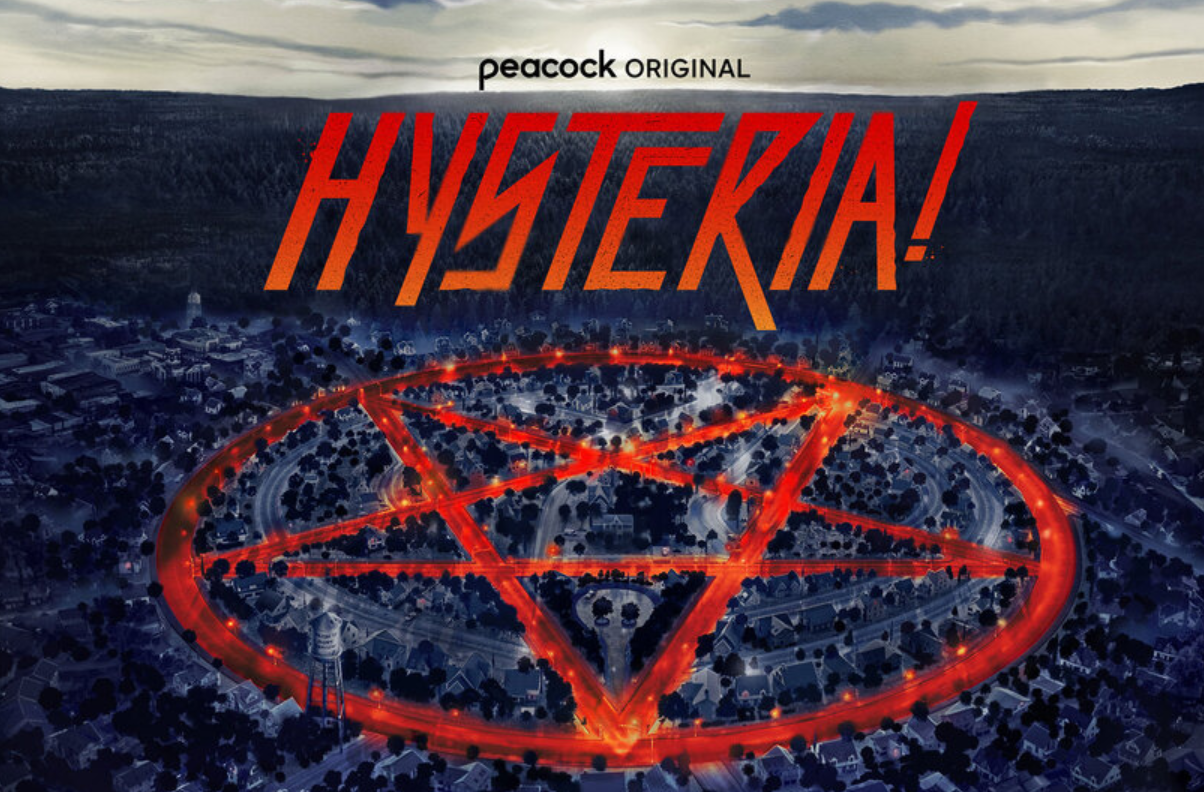Peacock’s new series, Hysteria!, kicks off with a chilling scene: a high school quarterback and his secret girlfriend are interrupted by an ominous knock at her bedroom door. The girl, flustered, hides her boyfriend in the closet, but her mother’s entrance is soon overshadowed by a masked intruder. Both teens are kidnapped, and only the boy’s disappearance is reported to the police, while a sinister pentagram appears on his parents’ garage door. Later, his body is found, supposedly the victim of a “ritualistic” killing. Thus begins the series, an homage to the 1980s Satanic Panic that gripped suburban America.
Created by Matthew Scott Kane, whose previous credits include the sci-fi series Stitchers, Hysteria! attempts to mix elements of horror, comedy, and social commentary in a tale centered on small-town Michigan, where the shadow of Satanism looms large. The town of Happy Hollow is thrown into chaos, with Bruce Campbell portraying the local police chief, Dandridge, who is tasked with keeping the peace. The panic is only inflamed by Tracy Whitehead (played by Anna Camp), a fervent Catholic mother who stirs fear and paranoia, hoping to fan the flames of a local culture war.
We also meet the Campbells, Linda (Julie Bowen) and Gene (Nolan North), parents to 17-year-old Dylan (Emjay Anthony), a teen who feels alienated despite having two close friends in Jordy (Chiara Aurelia) and Spud (Kezii Curtis). Though their band provides some solace for Dylan, it’s not until he sees a news report about the pentagram that inspiration strikes: he rebrands their group as a Satanic heavy metal band called Dethkrunch. The new identity boosts their popularity, drawing the attention of Dylan’s crush, the pristine Judith (Jessica Treska). But the band’s sudden transformation into a symbol of the occult only fuels the town’s hysteria, with Tracy Whitehead leading the charge, convinced that Dethkrunch is to blame for the town’s Satanic misfortune.
Linda, meanwhile, begins experiencing strange occurrences at home, from unexplained rashes to supernatural forces tossing her around the house. Yet despite the supernatural undertones, Hysteria! fails to elicit any real fear. The show, while superficially invoking the terror of the 1980s Satanic Panic, does so in a way that feels more like a half-hearted rehash of well-worn tropes.
Much of Hysteria! feels derivative, borrowing heavily from other popular series like Stranger Things, and blending in elements of Friday Night Lights and The Flash. While the show manages to hit the beats of these familiar genres, its surface-level treatment of the Satanic Panic leaves much to be desired. By the end of the fourth episode, the storyline reveals its hand too early, leaving little mystery to unravel. Where the series truly falters, however, is in its attempt to address deeper themes like generational trauma. The character of Tracy Whitehead, the overbearing religious zealot, is portrayed as a caricature, her fanaticism bordering on parody rather than anything truly frightening. The depiction of her trauma, which she then inflicts on her daughter Faith (Nikki Hahn), feels overly melodramatic and poorly executed, evoking the emotional subtlety of a daytime soap opera rather than a nuanced exploration of family dynamics.
The ensemble cast of Hysteria! feels equally disjointed, with each actor seemingly working within a different tonal register. Anna Camp’s portrayal of Tracy Whitehead, for instance, is so over-the-top that it verges on comedy, reminiscent of Dana Carvey’s Church Lady skits on Saturday Night Live. While this could have been an interesting direction for the character, the show fails to commit to any particular tone, awkwardly lurching between moments of humor and horror without fully developing either. As a result, Hysteria! struggles to find its footing, often feeling unfocused and inconsistent.
Bruce Campbell, a veteran of the horror genre, brings his signature blend of deadpan humor and charisma to the role of Chief Dandridge. He’s one of the few bright spots in the series, effortlessly juggling the absurdity of the town’s panic with a knowing wink to the audience. Unfortunately, Campbell’s screen time is too limited to elevate the show as a whole. Other talented actors, like Craig Cackowski, who made a memorable impression on Community, are similarly underutilized, leaving the cast’s potential largely untapped.
One of the show’s standout performances comes from Kezii Curtis, whose portrayal of Spud injects much-needed levity and energy into the proceedings. His wisecracking personality contrasts well with Dylan’s half-baked schemes and Jordy’s cynical outlook, creating a dynamic trio that occasionally captures the fun, rebellious spirit of adolescence. Yet even with these stronger performances, Hysteria! is weighed down by weak writing and uneven pacing, which prevent the characters from fully resonating with the audience.
While Hysteria! is set in the 1980s, its themes of moral panic and religious zealotry are undeniably relevant to today’s political climate. The fear of Satanism and the irrational hysteria surrounding it could easily be seen as a metaphor for modern-day anxieties about gender identity, censorship, and cultural regression. However, the show doesn’t push these parallels far enough to make any meaningful commentary. Unlike other works that play with 1980s nostalgia to interrogate the era’s social politics—such as the recent slasher comedy Totally Killer, which cleverly critiques the moral conservatism of the time—Hysteria! is content to merely recreate the aesthetics of the decade, without offering much in the way of substance or satire.
On a technical level, Hysteria! fares better, with solid production design and makeup work. The show’s setting, with its vintage cars, old-school TVs, and wood-paneled houses, effectively transports viewers back to the 1980s. Paul Cha’s makeup design, in particular, stands out, utilizing inventive color schemes and textures to create visually striking effects, especially in scenes where Linda is haunted by her mysterious ailment. But while the show may look the part, its narrative shortcomings prevent it from achieving the same level of nostalgia-infused brilliance as shows like Stranger Things.
Ultimately, Hysteria! is an underwhelming entry in the ever-growing genre of 1980s-inspired horror and comedy. It lacks the depth, scares, and cohesive tone needed to make a lasting impact. While there’s potential in its premise, the series’ failure to balance its horror elements with its attempts at humor and social commentary leaves it feeling muddled and unsatisfying. Hysteria! may serve as light entertainment for those who enjoy nostalgic throwbacks, but it falls short of offering anything truly innovative or memorable.



